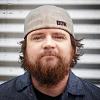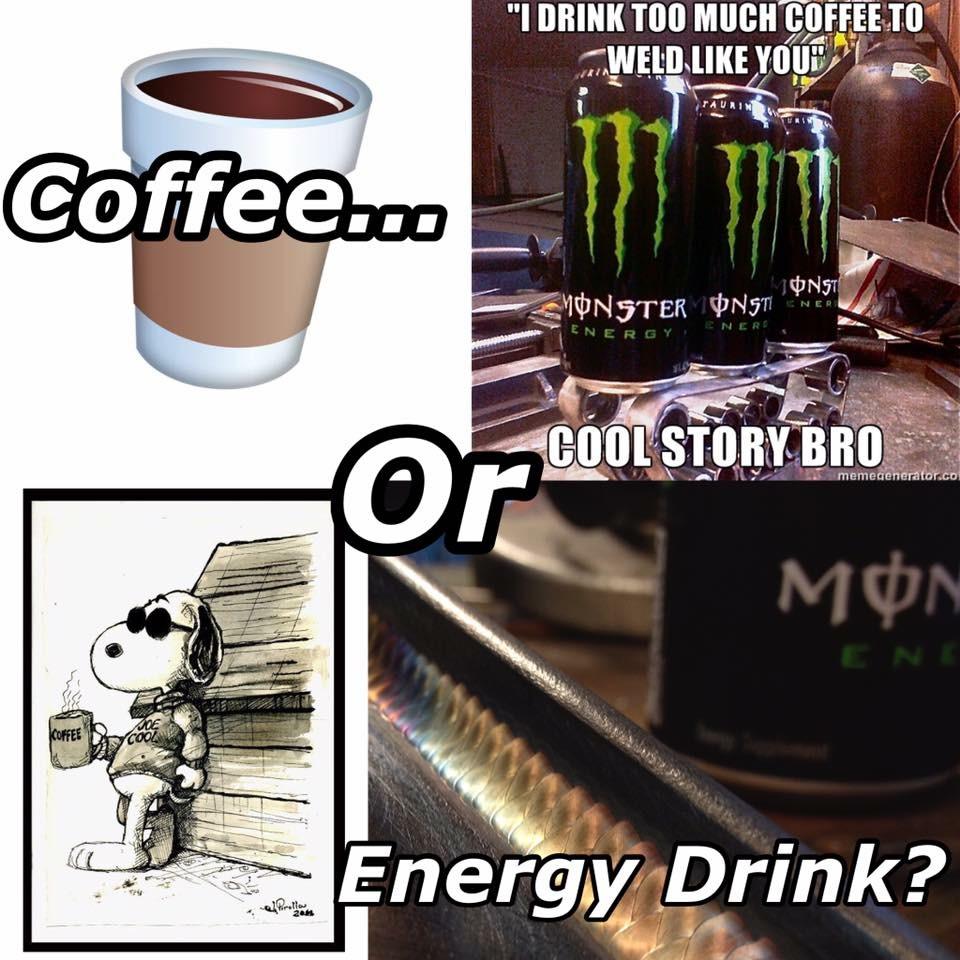Owner, Brown Dog Welding
- FMA
- The Fabricator
- FABTECH
- Canadian Metalworking
Categories
- Additive Manufacturing
- Aluminum Welding
- Arc Welding
- Assembly and Joining
- Automation and Robotics
- Bending and Forming
- Consumables
- Cutting and Weld Prep
- Electric Vehicles
- En Español
- Finishing
- Hydroforming
- Laser Cutting
- Laser Welding
- Machining
- Manufacturing Software
- Materials Handling
- Metals/Materials
- Oxyfuel Cutting
- Plasma Cutting
- Power Tools
- Punching and Other Holemaking
- Roll Forming
- Safety
- Sawing
- Shearing
- Shop Management
- Testing and Measuring
- Tube and Pipe Fabrication
- Tube and Pipe Production
- Waterjet Cutting
Industry Directory
Webcasts
Podcasts
FAB 40
Advertise
Subscribe
Account Login
Search
Coffee or energy drink?
What your choice says about you and the future workforce
- By Josh Welton
- August 17, 2017
Sometimes I forget how old I am. Yeah, I literally forget my age on occasion. I’ve spent most of this year telling people I’m 38 when I’m actually 39. I’ve been plus or minus a year since I was 16, but mostly, I forget I’ve been in the trades for 15 years.
I’ve been in and out of factories for more than 20 years, and I’ve gone from being the kid asking too many questions to a guy who’s been around the block and gets asked a lot of questions. My denial of the fact that I’m not part of the youth movement anymore became apparent in the results of an informal poll question I recently asked on Facebook and Instagram: Coffee or energy drink?
I also asked that respondents share their age.
If you’ve ever worked in a factory or shop or out in the field, you know that not much happens until the caffeine starts to flow. I remember getting up “early” when I hung out with my grandpa and grandma and the smells and sounds of that first pot of coffee brewing in the morning before we’d head out to do tasks around the farm.
Then I spent part of five years at Steelcase, working either in plant maintenance or on a paint line, and no matter the department or the shift, most of my co-workers needed that first cup of coffee to get going.
Where I worked at Chrysler and now at General Dynamics, it is the same story. One by one, guys hit the coffee machine first thing every shift.
I don’t like coffee. Never have. I always kind of felt left out of the tradition. Sure, Coke and Pepsi had caffeine, but it wasn’t really the same. Then in the late ’90s a thing happened: energy drinks. Red Bull was first to the states, and I was in California shortly after it hit the Pacific Coast.
To me, these drinks seemed like half sugar, half syrup, and magic, and I was all about them. Then Monster came on the scene during my first years at Chrysler. It was love at first taste. Suddenly dozens of new energy drinks were introduced as the big soft drink companies all tried to capitalize.
At one time during my apprenticeship, when I was on second shift, my journeyman would bring a handful of different energy drinks to work each afternoon as we tried to do a very scientific study of which one was the best in taste and energy boost. Only one conclusion could be drawn from this precise test: I love sugar.
There’s an obvious shift happening right now in the blue-collar workforce and skilled trades. The “old” older generation of five years ago, the one that everyone has been warning us will retire and take all their knowledge with them, is either gone or close to it. But there is a smaller, second “seasoned” generation that provides a firsthand link to that group—men and women 35 years and older who have now been in a trade for more than a decade and can carry the torch.
The knowledge and tricks of the trade have been passed on to this generation, and now it’s even tangible in another form, social media. This is where the next generation lives. Thirty-four years and younger, they’ve filled in a vacuum where the second generation left gaps. My feeling is that there was a five- to 10-year period in which many potential trades workers were pushed in directions other than “getting their hands dirty.” But contrary to popular belief, there is not some crazy shortage on our side of the fence; it just shifted to the younger set. This group has a lot of respect for old-school methodology while putting it to practice in different ways.
So, what does this have to do with coffee and energy drinks? Everything! How we take our caffeine says a lot about who we are and where we stand. And where I previously thought that the energy drink crowd, my group, was part of the younger generation, my informal poll draws a clear line, and I’m really kind of old.
The splits in the survey prove beyond a shadow of a doubt that these lines of demarcation defining three generations actually exist.
If you’re 50 or older, you drink coffee. Out of 21 responders in that age group, 17 drink only coffee; zero drink only energy drinks; and 2 like both.
In the 35 to 39 age group, 99 people replied: 39 percent drink only energy drinks; 34 percent drink only coffee; and 17 percent drink both.
Now for the youngsters. With 199 kids (I say that affectionately) weighing in, a whopping 75 percent drink coffee; 50 percent drink only coffee; a mere 16 percent drink only energy drinks; and about 25 percent like both.
The one constant in all three age groups is that about 1 in 10 doesn’t partake of either.
What comes around goes around. Many cited health reasons for either quitting or not even trying energy drinks. A lot of the youngsters added their blend of choice when putting a check mark next to coffee.
I think the numbers say something about our industry as well. While the middle-age group (argh, I hate that label) responded in equal numbers on Facebook and Instagram, old-timers almost exclusively used Facebook. There were more responders in the youngest age group on both platforms, with 63 percent of all replies coming from them. Just the Instagram replies alone from the 34 and younger crowd were more than the other two age groups on both sites combined. These aren’t IT professionals or gamers or service industry workers; they’re machinists and millwrights and fabricators.
So, while the numbers of workers who still carry on the ritual of beginning their shift with a caffeine rush remain the same, overwhelmingly the kids have shunned my generation’s energy drinks in favor of returning to the blue-collar tradition of a coffee wake-up. And I think it serves as a metaphor. Our trades are in good hands.
But when did I get so old?
subscribe now

The Fabricator is North America's leading magazine for the metal forming and fabricating industry. The magazine delivers the news, technical articles, and case histories that enable fabricators to do their jobs more efficiently. The Fabricator has served the industry since 1970.
start your free subscriptionAbout the Author

- Stay connected from anywhere

Easily access valuable industry resources now with full access to the digital edition of The Fabricator.

Easily access valuable industry resources now with full access to the digital edition of The Welder.

Easily access valuable industry resources now with full access to the digital edition of The Tube and Pipe Journal.
- Podcasting
- Podcast:
- The Fabricator Podcast
- Published:
- 04/16/2024
- Running Time:
- 63:29
In this episode of The Fabricator Podcast, Caleb Chamberlain, co-founder and CEO of OSH Cut, discusses his company’s...
- Trending Articles
Tips for creating sheet metal tubes with perforations

Supporting the metal fabricating industry through FMA

JM Steel triples capacity for solar energy projects at Pennsylvania facility

Fabricating favorite childhood memories

Omco Solar opens second Alabama manufacturing facility

- Industry Events
16th Annual Safety Conference
- April 30 - May 1, 2024
- Elgin,
Pipe and Tube Conference
- May 21 - 22, 2024
- Omaha, NE
World-Class Roll Forming Workshop
- June 5 - 6, 2024
- Louisville, KY
Advanced Laser Application Workshop
- June 25 - 27, 2024
- Novi, MI



























